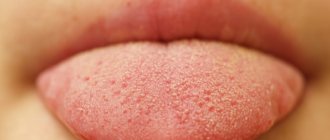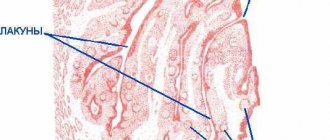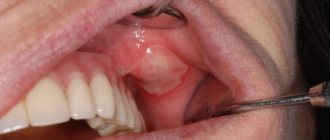Sweet taste in the mouth, causes, symptoms
A sweet taste in the mouth may indicate serious illness.
The human tongue is equipped with special receptors, thanks to which the taste of food and the sensation after it are felt. Why does it taste sweet?
Changes in any department lead to disruption of body functions and distortion of impulses sent to the brain.
They return to the receptor papillae on the tongue and completely change the sense of taste, so that sour and bitter tastes are perceived as sweet after food is eaten.
When absorbing food, the concentration of taste is high and its change is not observed.
How to deal with the problem
The taste of garlic in the mouth can cause many unpleasant moments and disrupt important plans or negotiations. Due to its special specificity, caused by the presence of sulfurous substances, the taste itself will disappear only after they are removed from the body through decay products, biological fluids or respiration. You can also relieve an unpleasant symptom on your own by:
| Cow's milk | Drinking 200 ml of milk or rinsing your mouth with it, due to the calcium contained in milk, repels the garlicky taste, effectively eliminating it. |
| Bay leaf or parsley | The greens will mask the garlicky taste, but should only be eaten after careful oral hygiene. In addition, bay leaves have a rather unpleasant taste. |
| Lemon or lime | Drinking lemon or lime juice after eating garlic will prevent the unpleasant taste, but may be dangerous for people with gastritis or high stomach acidity. |
| Coffee beans | Chewed thoroughly, they will hide the garlicky taste and prevent bad breath. |
| Mint leaves or mint chewing gum | They have a good effect, but can overpower the taste of garlic for more than 30 minutes. |
Green tea, spinach, apples and basil also help prevent an unpleasant aftertaste, but you can try to prevent the garlic taste by eating the whole plant rather than chewing it.
Causes of sweet taste
A disorder in the digestive system can cause a sweet taste in the mouth.
The reasons for the change in taste in the mouth to a sweet taste are:
- Disorders of the digestive system. Occurs with gastritis and peptic ulcers, when there is an increased level of acidity. From the stomach, part of the processed food is thrown into the esophagus.
- Presence of Pseudomonas aeruginosa. This infection often affects the sinuses, causing congestion, difficulty breathing, and chest pain. Taste sensations are disturbed.
- Smoking. In the tongue receptors, with constant exposure to nicotine, the perception of taste changes.
- Poisoning with chemicals (pesticides).
- Pancreatitis. The development of pancreatitis is indicated by a persistent aftertaste in the morning and an unpleasant burning sensation in the stomach.
- Liver pathology.
- Impaired carbohydrate metabolism, overeating or eating a lot of sweets.
- A state of constant stress and tension. Inflammation of the facial or trigeminal nerve.
- Diabetes mellitus, in which a sweetish taste is formed in the mouth, additional symptoms appear: hunger, thirst.
- Dental problems, diseases of the nasopharynx: pharyngitis, tonsillitis, otitis media, sinusitis, caries, periodontal disease.
- When women become pregnant, functional changes occur throughout the body. Taste priorities also change.
- Respiratory tract infection.
Additional symptoms of bitterness in the mouth
Bitterness in the mouth may be accompanied by additional symptoms. If heaviness or pain is felt in the right side, this may indicate liver or gallbladder disease. If bitterness in the mouth is accompanied by nausea, heartburn, and belching, then the cause may be stomach diseases. If the cause is diseases of the oral cavity, then the feeling of bitterness may be accompanied by bad breath.
That's the salt!
Article on the topic
Between chocolate and cucumber. What do taste preferences indicate? Most often, saliva becomes salty if a person neglects oral hygiene or simply experiences thirst, which, by the way, may not be felt. Hidden fluid deficiency often occurs due to taking medications, drinking alcohol, coffee, tea, cola, and also due to smoking. Therefore, if you experience such sensations, brush your teeth more thoroughly and drink at least 8 glasses of clean water a day. But if this doesn’t help, you need to figure it out. The causes of a salty taste may include:
infectious and fungal diseases of the nasopharynx - for example, sinusitis: mucus that accumulates in the sinuses can drain into the mouth and cause a salty taste. In this case, consultation with an ENT specialist is necessary;
diseases of the salivary glands , which develop due to the entry of streptococci, staphylococci, pneumococci into the salivary ducts. Go to the dentist!
Continued: Bad taste in the mouth, causes →
Set my teeth on edge
Frequent heartburn and sour belching often accompany pregnancy: the growing uterus puts pressure on the diaphragm, intra-abdominal pressure increases. Those who eat a lot at night also often experience a sour taste in their mouth in the morning. But if these reasons have nothing to do with it, then it is better to deal with this symptom specifically. A persistent sour taste can occur:
Article on the topic
Diagnosis by a drop of blood. Siberian scientists identify potential diseases
for diseases of the digestive tract - often this is a sign of hyperacid gastritis, which is accompanied by increased stomach acidity, or gastroesophageal reflux, as well as gastric ulcer. If, in addition to a specific taste, a person is bothered by pain in the upper abdomen, nausea after eating, heartburn, sour belching, frequent diarrhea or constipation, weakness, it is worth visiting a gastroenterologist. And in order not to guess, you need to do a gastroscopy;
in case of problems with teeth - with caries, gingivitis, periodontitis, in addition to a sour taste in the mouth, there may be toothache, swelling and bleeding of the gums. Hurry to the dentist!
Possible complications
The taste of garlic in the mouth, which appears as a result of eating the plant or due to hormonal imbalance, does not require the use of medications and disappears on its own after 24-72 hours. Milk, lemon juice or parsley will help speed up the process of removing sulfurous substances from the body.
If the unpleasant taste is caused by the development of dental pathologies, diseases of the ENT organs or gastrointestinal tract pathologies, corrective treatment is required aimed at eliminating the disease and preventing further infection. If left untreated, the unpleasant condition will only worsen, leading to the destruction of tooth enamel, breathing or digestion problems.
The most dangerous cases are arsenic poisoning and selenium overdose, which can cause death. In this case, when a garlic taste appears, it is necessary to take emergency measures to prevent further toxic effects, as well as quickly cleanse the body.
The appearance of a garlic taste in the mouth is one of the common symptoms that often occurs during the season of respiratory infections and is associated with eating the vegetable. A garlic taste that disappears after careful oral hygiene or drinking milk can also be a symptom of hormonal dysfunction or heavy metal poisoning, as well as diagnose gastrointestinal problems that require medication and a special diet.
Diagnosis and which doctor to contact?
It is worth noting! If a person experiences the taste of fish in his mouth and those around him smell it, then this becomes a big psychological problem.
To avoid it and understand the causes of this condition, you should seek help from a doctor.
Initially, you can contact your dentist to rule out problems with the oral cavity.
If everything is fine with this, then plan your next visit to a therapist .
The doctor will conduct a general examination and, if necessary, refer you to specialists.
Diagnostic procedures may include the following research techniques:
- Abdominal ultrasound to identify gastrointestinal diseases and sinus ultrasound to rule out problems in this area;
- taking scrapings from the mouth ;
- donating blood for analysis;
- checking sputum for the presence of fungal infection;
- X-ray of lung tissue, nasal septum;
- in extreme cases, a biopsy is performed;
- immunogram;
- CT and MRI.
After receiving all the test results, the general practitioner will be able to decide which specialist to refer the patient to.
Depending on in which organ the problem of fishy taste in the oral cavity lies, the attending physician is determined who can eliminate the disease.
Keep in mind! This could be an endocrinologist, dentist, gastroenterologist, neurologist, otolaryngologist and other specialized specialists.
Taste of garlic in a child
The taste of garlic that appears in a child’s mouth can occur both after eating a vegetable and in the case of using medications containing garlic (choleretic drugs). In addition, a child’s garlic taste is one of the reasons for poor oral hygiene, which provokes the accumulation of bacteria or dental pathologies.
Children can also provoke a garlic taste:
- sore throat and condition of the tonsils;
- gas formation, stomach cramps;
- problems with urination;
- frequent stress.
If you visit the dentist and there are no oral problems, parents should make an appointment for the child to see a therapist to eliminate adenoid diseases, and also take a urine test.
Due to inflamed tonsils
If there is pathology of the tonsils, the baby will be prescribed conservative therapy or surgical removal of the inflamed cavities.
Treatment always begins with conservative therapy, including:
- washing the tonsils with infusion of chamomile or calendula, or saline solutions;
- the use of nasal drops with a drying and anti-inflammatory effect (solutions of protargol, collargol, albucid);
- taking vitamins C, D and ascorutin;
- prescription of physiotherapeutic treatment (UV irradiation of the nasopharynx, electrophoresis with drugs, laser therapy);
In the absence of positive results, as well as in the case of frequent (more than 4 times a year) respiratory diseases, surgical intervention is performed.
Due to problems with urination
To diagnose genitourinary pathologies, it is necessary to take a urine test, after which the doctor may prescribe an ultrasound of the kidneys and bladder, or an x-ray to clarify the diagnosis.
After the diagnosis is made, the following is prescribed:
- antibacterial therapy (Amoxicycline, Ceftrianson or Furazidine);
- ibuprofen;
- desensitizing agents (Loratadine);
- vitamin and mineral complexes.











